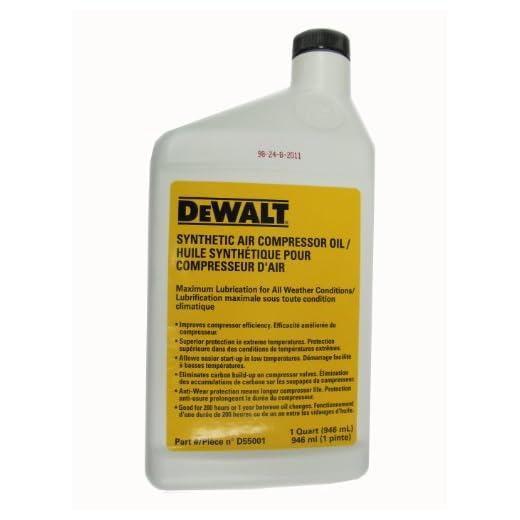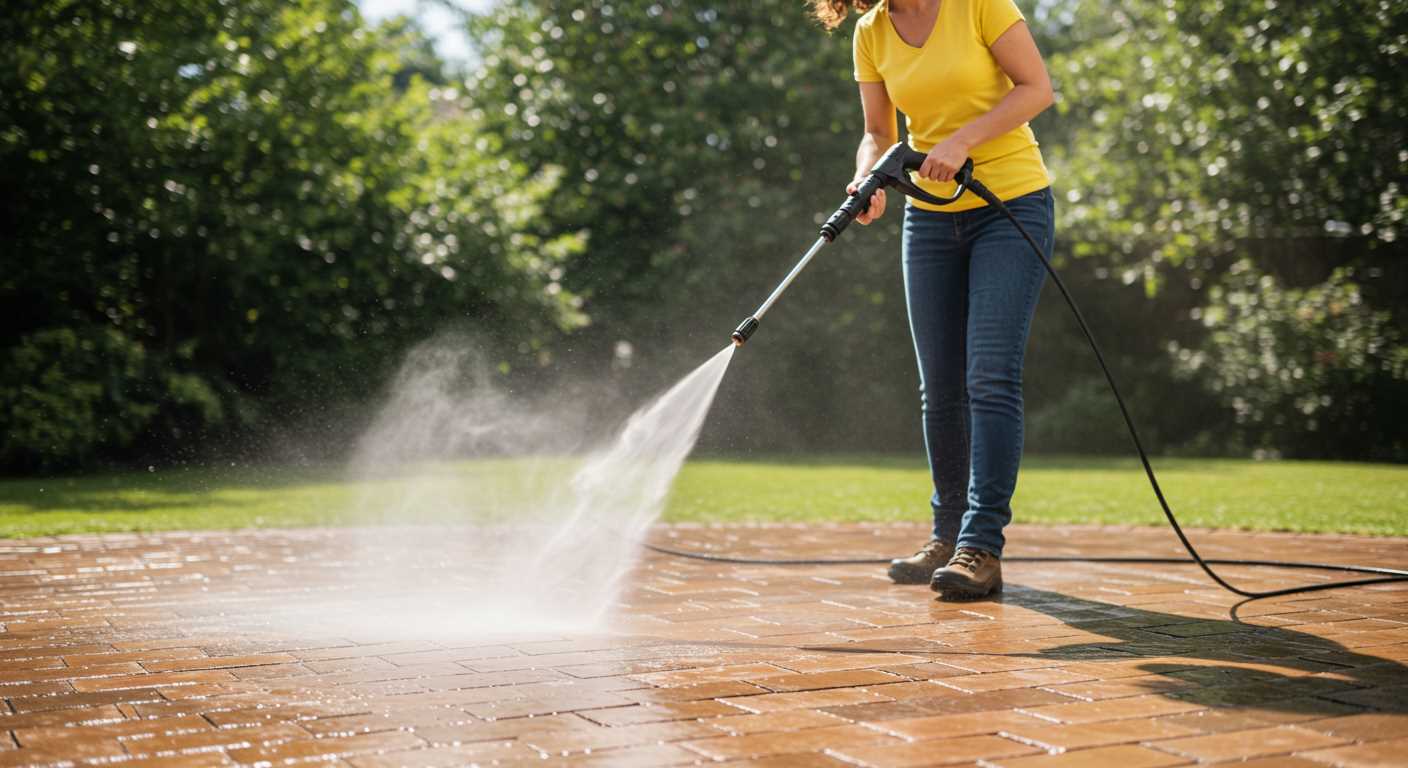



For the efficient functioning of high-pressure cleaning machinery, I strongly recommend using non-detergent oil specifically designed for pumps. This type of lubricant prevents foaming and ensures seamless operation over time. Look for mineral-based options that are purpose-built for these machines, as they provide superior protection against wear and rust.
In my decade of experience, I’ve seen that a viscosity of 30 weight is typically ideal for most models. This allows for smooth movement of components without causing excessive strain on the motor. Additionally, always check the user manual for manufacturer-recommended products, as specifications may slightly vary across brands and designs.
Always remember to maintain proper oil levels and replace worn-out lubricant on a regular basis. By doing so, you extend the life of your equipment and maintain its performance. Neglecting this crucial aspect can lead to costly repairs and reduced efficiency.
Choosing the Right Liquid for Your Cleaning Equipment’s Mechanism
I recommend using high-quality pump lubricant specifically designed for cleaning devices. These lubricants often have synthetic or non-synthetic base oils tailored to meet the demands of the equipment’s operational conditions.
It’s best to avoid automotive oils, as they can contain additives unsuitable for the seals and components found in these machines. Always check the manufacturer’s guidelines; a common recommendation is a non-detergent SAE 30 or straight weight oil, which provides effective protection against wear and helps maintain optimal performance.
When servicing your device, ensure to replace the liquid in the reservoir regularly to prevent any degradation that could lead to mechanical issues. Monitoring the level is crucial, and I suggest checking it after every few uses. If you notice any contamination or discoloration, it’s time for a change.
Remember to operate your cleaning tool within the recommended temperature ranges for the lubricant to maintain viscosity and performance. High temperatures can break down the liquid, affecting its protective qualities.
Understanding Pump Specifications for Oil Selection
Always refer to the manufacturer’s guidelines to identify the exact specifications for the lubricant required. The compatibility of a fluid with the internal components is paramount, as misapplication can lead to premature wear or malfunctions. Most commonly, pressure cleaning units utilise non-detergent, heavy-duty lubricants with specific viscosity ratings, typically between 10W and 30W.
| Viscosity Rating | Recommended Application |
|---|---|
| 10W | Optimal for low-temperature environments |
| 20W | Versatile choice for moderate climates |
| 30W | Suitable for high-temperature operations |
Using the incorrect fluid can compromise the seal integrity, resulting in leaks and decreased performance. Always ensure that the selected lubricant meets the industry standards and check the compatibility with the pump construction materials. Regularly inspect the fluid levels to maintain optimal functionality, and replace it as advised in the maintenance schedule. This ensures longevity and reliability, preventing costly repairs down the line.
Types of Oil Compatible with Pressure Washer Pumps
For reliable functionality, select lubricants that match your machine’s specifications. Here are common categories and recommendations:
Synthetic Fluids
.jpg)
- These are engineered to offer superior protection against wear and extreme temperatures.
- Look for those specifically designed for high-pressure equipment.
- They often extend service life and enhance performance.
Conventional Oils
- Mineral-based fluids can work well for basic models.
- Ensure the viscosity matches your model’s requirements.
- Although effective, they may not perform as well in extreme conditions compared to synthetic options.
Always consult the manufacturer’s guidelines for the most suitable type tailored to your equipment. Additionally, stay informed about any recalls or updates pertaining to lubrication standards, as manufacturers may revise their recommendations based on new findings.
Recommended Oil Brands for Pressure Washer Pumps

For optimal performance of your cleaning equipment, I suggest using high-quality lubricants specifically designed for pump systems. Here are some reliable brands I’ve encountered during my years of testing and consulting:
1. Honda

Honda’s pump lubricants are formulated for their engine-driven models. They provide excellent protection against wear and can withstand high temperatures, ensuring longevity of your machinery.
2. Briggs & Stratton
This brand offers a variety of lubricants suitable for different pump types. Their oils maintain stable viscosity and provide superior resistance to breakdown under pressure, making them ideal for rigorous tasks.
The choice of lubricant plays a crucial role in the efficiency and lifespan of your cleaning device. I strongly recommend checking the specifications of your particular pump model to ensure maximum compatibility with these brands.
3. Dewalt
Dewalt produces specialised fluids that enhance pump performance and reliability. Their formulations are designed to reduce friction and facilitate smooth operation, which is essential for maintaining peak performance.
4. Excell
Excell’s lubricants are designed for ease of use and compatibility with various units. They offer great protection from rust and corrosion, ensuring that internal components remain in good condition.
While these brands are standouts, always refer to your manufacturer’s recommendations for the best results. Regular maintenance with the correct lubricants will significantly contribute to the efficiency and durability of your equipment.
How to Change the Oil in a Pressure Washer Pump
First, ensure the machine is turned off, disconnected from power and cool to the touch. Prepare a clean work area and gather necessary tools: a wrench, a funnel, a suitable container for the old lubricant, and absorbent rags.
Locate the oil filler cap, typically situated at the top of the unit. Use a wrench to loosen and remove it. Next, position the container beneath the drain plug, usually located at the bottom or side. Remove the drain plug carefully, allowing the used substance to flow into the container. Dispose of it responsibly according to local regulations.
Filling with Fresh Lubricant
Once the old material has completely drained, replace and tighten the drain plug. Place the funnel into the filler opening and pour in the new lubricant slowly, stopping occasionally to check the level. Fill it to the manufacturer’s recommended line, avoiding overfilling. After filling, remove the funnel and securely replace the filler cap.
Final Checks
Before starting the unit, inspect for any leaks around the drain and filler areas. Run the machine briefly and observe for any unusual noises or leaks. If everything is functioning correctly, clean up and store your tools. Regular maintenance extends the life of your unit and ensures optimum performance.
Signs of Improper Oil Use in Pressure Washer Pumps
Frequent overheating is a clear indication that the lubrication system isn’t functioning as it should. When components aren’t sufficiently bathed in the right fluid, friction escalates, leading to increased temperatures. This can severely damage the internals of the machinery.
Filtering issues often manifest as unusual noises or vibrations during operation. If you hear knocking or grinding, it may signal that the wrong liquid has been used, causing wear on critical parts. Additionally, low fluid levels can also create similar symptoms, which is vital to check regularly.
Look for leaks around seals and joints. If there’s visible fluid escaping, it could be due to incorrect viscosity. This can compromise performance and lead to more extensive mechanical failures.
Another telltale sign is excessive smoke or fumes. If the equipment is producing more exhaust than typical, this may indicate the presence of an unsuitable fluid quality that degrades more quickly under heat.
Pay attention to the flow rate. A noticeable drop in performance, such as weak water output, often suggests that lubrication is subpar. This affects the overall efficiency, and immediate action is necessary to prevent further damage.
Finally, checking the colour and consistency of the liquid can reveal whether a suitable variant has been used. A burnt smell or dark coloration indicates degradation, which directly affects the system’s reliability. Keep a close watch on these factors to ensure longevity and optimal functionality of your cleaning equipment.
Maintenance Tips for Pressure Washer Pump Oil
Regular checks are crucial. I recommend inspecting the lubricant every 50 hours of operation or at the beginning of the season. Ensure the level is between the minimum and maximum marks–too low leads to inadequate lubrication, while overfilling can cause foaming and reduced performance.
Keep the sealing areas clean. Contaminants can deteriorate gaskets and lead to leaks. Always wipe the area around the fill cap before opening; this prevents dirt from entering the chamber.
Perform a complete change of the liquid at least once a year, or more frequently if the machine is used heavily. Old lubricant can degrade and lose its effectiveness, leading to potential damage.
Storing the cleaning unit properly also matters. Keep it in a dry and cool environment to avoid moisture contamination. If storing for a long period, consider draining the chamber to prevent issues with sediment buildup.
Always follow the manufacturer’s recommendations for the specific type to ensure compatibility and performance. Test the consistency of the liquid when changing it; ideally, it should maintain a smooth texture without visible particles.
Pay attention to unusual noises during operation. If you hear grinding or whining, it might indicate inadequate lubrication, warranting immediate investigation.
FAQ:
What type of oil is recommended for a pressure washer pump?
The recommended oil for a pressure washer pump typically depends on the manufacturer’s specifications. Many brands advise using a specific type of pump oil designed for high-pressure systems, such as non-detergent oil or 30-weight motor oil. It’s important to consult the owner’s manual or manufacturer guidelines to ensure the correct type and viscosity of oil is used to maintain optimal performance and longevity of the pump.
How often should I change the oil in my pressure washer pump?
Changing the oil in your pressure washer pump is crucial for maintaining its functionality. Most manufacturers recommend checking the oil level before each use and changing it annually or after 100 hours of operation, whichever comes first. Regular oil changes help to remove impurities and prevent wear and tear, ensuring that the pump operates smoothly and efficiently.
Can I use regular motor oil in my pressure washer pump?
Using regular motor oil in a pressure washer pump is generally not advisable. Most manufacturers recommend specific pump oils that have been formulated for high-pressure applications. Regular motor oil may contain detergents and additives that can harm the pump seals and performance. Always refer to the user manual for the appropriate oil type to ensure proper operation and avoid potential damage.
What is the purpose of oil in a pressure washer pump?
Oil in a pressure washer pump serves several important functions. It lubricates the internal moving parts, reducing friction and wear, which helps to prolong the pump’s life. Additionally, it helps in dissipating heat generated during operation, ensuring optimal performance. Proper lubrication also aids in preventing corrosion and the accumulation of dirt and debris, contributing to the overall efficiency of the pump.
Is there a specific brand of oil I should use for my pressure washer pump?
While there are many brands that offer oil suitable for pressure washer pumps, the best practice is to follow the recommendations outlined in your machine’s owner’s manual. Many leading names in pressure washers, such as Honda or Karcher, offer their branded pump oils that are specifically formulated for their equipment. Using manufacturer-recommended products helps to ensure compatibility and effectiveness.







